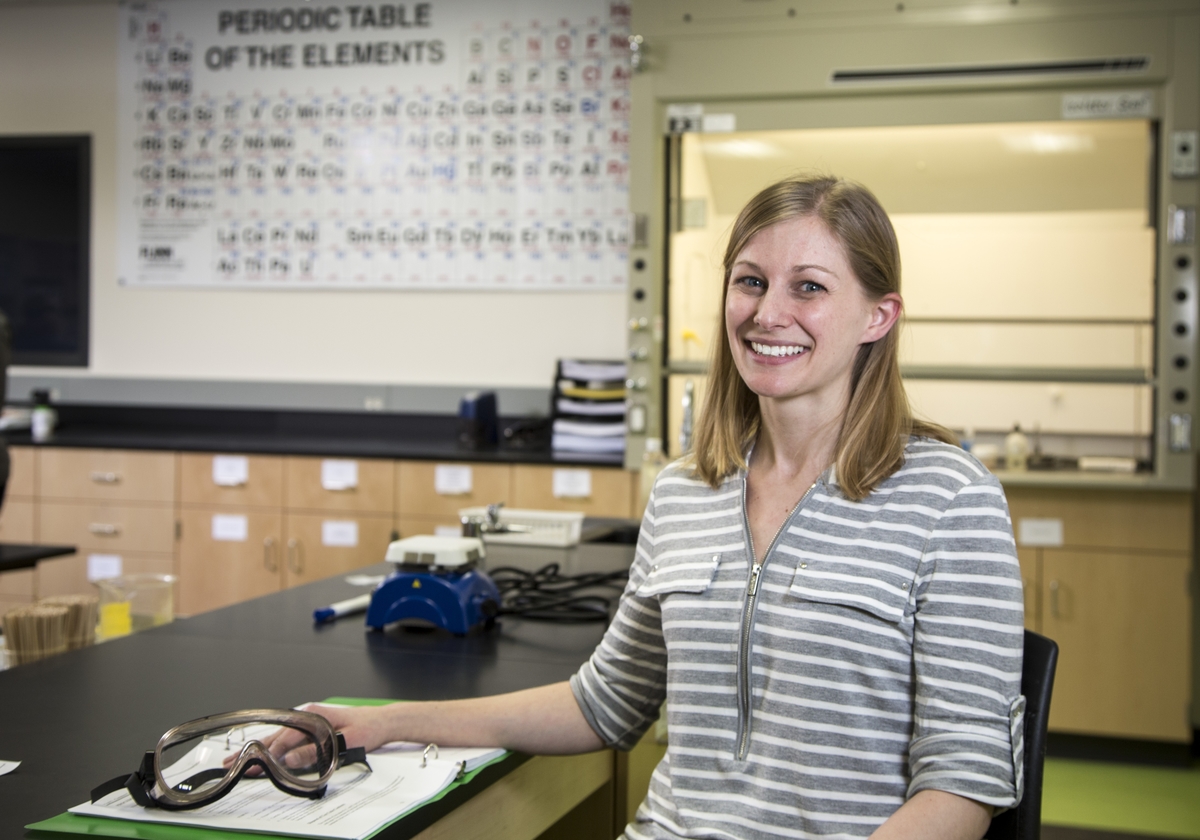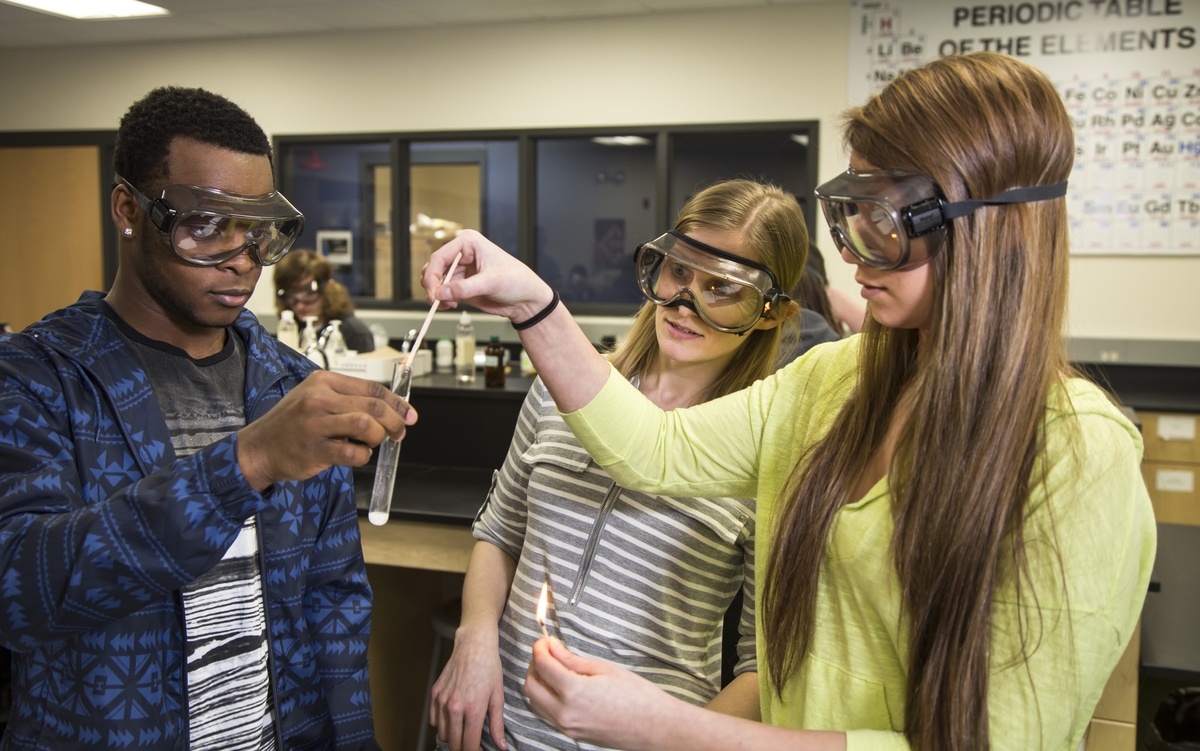Experience Is the Best Teacher: How the Delta Program Is Creating a Better STEM Faculty
April 4, 2016 | By Lynn Armitage

Christen Smith, chemistry teacher at Madison College, and alumna of the Delta Program in Research, Teaching, and Learning
Even as a doctoral student in environmental chemistry and technology, Christen Smith wasn’t entirely sold on being a teacher one day. “I needed to figure out if teaching was something that I wanted to pursue,” said the University of Wisconsin–Madison alum who participated in the Delta Program in Research, Teaching, and Learning while in graduate school, hoping for career enlightenment.
Through Delta, Smith helped to develop an internship that allowed her to create a real curriculum and teach it to a real class as a guest lecturer—a plum opportunity difficult to find in graduate school that afforded her the professional insight she needed. “The Delta Program gave me practical experience in teaching and made me realize that it really was a field I wanted to go into.”
Like Smith, now a chemistry teacher at Madison College, the Delta Program has helped to prepare hundreds of UW–Madison graduate students for faculty positions in STEM fields ever since it became a founding member of the Center for the Integration of Teaching and Learning (CIRTL), established within the Wisconsin Center for Education Research (WCER) in UW–Madison’s School of Education.
“As CIRTL members, universities commit to developing local learning communities, like Delta, that promote proven teaching and mentoring techniques for their STEM graduate students,” explains Don Gillian-Daniel, associate director of the Delta Program. “The Delta Internship Program pairs graduate students and post-docs with faculty and staff to design and implement evidence-based teaching projects to improve student learning.”
CIRTL’s network recently more than doubled to now 46 top research universities that collectively produce one-third of U.S. doctoral degrees in science, technology, engineering and mathematics. These learning communities provide valuable teaching resources sorely needed in STEM education. According to the most recent statistics from the National Math + Science Initiative, 38 percent of students who start with a STEM major do not graduate with one.
Kitch Barnicle, executive director of the CIRTL Network, points to ineffective teaching as the reason students shift course. “Historically, STEM graduate coursework has been focused on creating great researchers in specific academic fields. In fact, new professors often face their first classes of students with little preparation in teaching,” says Barnicle. “Our goal is to develop great researchers who also are great teachers, not one or the other.”
When Zachary Handlos enrolled in his first Delta graduate course in 2011, he was assigned to lead an afterschool science club at Hamilton Middle School in the Madison Metropolitan School District. “That class pretty much got me hooked on teaching,” he shares. A self-proclaimed weather geek and tornado chaser who watched the Weather Channel religiously as a kid, he plans to teach atmospheric and oceanic sciences as an instructor at a small liberal arts college—or as a university professor—after earning his Ph.D. in May. Thanks to a Delta internship, he is definitely up for the task.

Christen Smith in the Chemistry lab with Madison College students.
“My Delta internship taught me how to get students engaged in the classroom using hands-on, active learning methods instead of relying on traditional teaching that usually puts everyone to sleep.” He strongly advises other graduate students, “If you have any interest in teaching and want to get better at it, Delta is the place to go.”
That “learning by doing” concept is what attracted Ana Porras to the Delta learning community. “When I got to graduate school, I knew I needed to improve my teaching skills and get a lot more training,” explains the international graduate student from Colombia who is working on a Ph.D. in biomedical engineering. “First, I enrolled in a lab for international students and faculty, where I learned about different teaching theories. Then I got more involved in the program and started facilitating brown-bag discussions.” Porras was recently asked to oversee a Delta research mentor training seminar this summer.
In addition to facilitating internships, Delta offers a robust schedule of courses, programs, events and resources developed on the CIRTL core ideas of teaching-as-research, learning communities and learning-through-diversity. Delta also collaborates on cross-network projects with CIRTL partners and participates in national offerings, such as MOOCs—massively open online courses—combined with local, in-person group meetings.
Robert Mathieu, founder of the Delta Program and director of WCER, emphasizes the importance of developing national connections through network exchanges and virtual courses. “We are also connecting the university learning communities online, so graduate students have a far more diverse experience in higher education than just their own campus,” he says. “For instance, a student at Vanderbilt University can also be learning about teaching from another student or professor at Howard University.”
Last year, Kimberly Dill-McFarland was selected by her UW–Madison professor to teach a sequencing class to 35 students in Brazil who primarily spoke Portuguese, and some English. “I speak French, so that was super not helpful.” The microbiology graduate student admits she was terrified, as it was her first time in front of a classroom. “Without my teacher training in Delta, I wouldn’t have known what to do. I kept flashing back to courses and discussions from Delta and that helped me get through it.”
As it turned out, that capstone teaching experience in Brazil cemented her career choice. “It was really hard and really stressful, but I realized later that I wanted to teach that course again. And if I wanted to do that, then I probably wanted to be a teacher,” she recalls.
Dill-McFarland, who has participated in the Delta Program for nearly four years, tells us what the greatest takeaway of this experience has been: “That teaching is research. The idea that the great teachers we have all had in our lives weren’t necessarily always great at teaching,” she says. “But it’s something that you can learn and something that you can continue to improve upon.”


